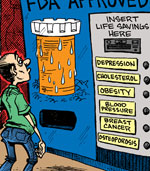What You Need to Know About Carnitine Deficiency
| Share on Facebook | Share on Twitter | Share on Google+ |
Effects of L-carnitine Deficiency
Carnitine is an amino acid which helps in the transport of fatty acids into the mitochondria in your cells where they are broken down and turned into energy. Thus, if you do not have enough carnitine present in your system, your body will not be able to use up fatty acids causing them to build up, and causing you to immediately feel weak after little exercise. It also leads to hypoketosis, muscle aches, fatty liver and myopathy.
In infants, on the other hand, carnitine deficiencies more often lead to arrhythmias and in worse conditions can lead to death.
Two Kinds of Carnitine Deficiency Syndrome
There are two general kinds of carnitine deficiency, namely primary and secondary:- Primary carnitine deficiency is usually a genetic defect; if you primary deficiency, your carnitine transporter does not tend to function well so that it prevents carnitine from being transported into the cells.
- Secondary deficiency however, happens if due to metabolic disorders in your cell mitochondria, such as metabolic pathway blockage that leads to acyl compound build-up. This usually results from a faulty process in the L-carnitine cycle.
L-carnitine Deficiency in Infants
Infants are more susceptible to carnitine deficiency. During our infancy and childhood years, cell and tissue growth is usually rapid such that the demand for tissue accretion and energy utilization leads to the depletion of L-carnitine at a rate faster than our ability to synthesize it. Thus, carnitine is richly found in breast milk as well as in most milk formulations.
L Carnitine Supplements for Carnitine Deficiency
If you have any one of the mentioned kinds of carnitine deficiencies, you should take increased amounts of L-carnitine and take carnitine supplements. Natural L-carnitine can be found in red meat and dairy products. You can also get them from fish, poultry, asparagus, wheat and peanut butter. You cannot find them in vegetables and plants. Typical diets only provide at most 100 milligrams of carnitine per day which is not enough if you have carnitine deficiency.
About 25% of the carnitine in your body gets produced by your kidneys and liver, and the rest of the 75% should be taken from dietary intake through the abovementioned food sources. Flooding the body with a good concentration of carnitine will ensure some supply of carnitine to enter the cells.
L-carnitine Dosage
The recommended l carnitine dose varies depending on the form of L-carnitine vitamins being taken. For adults and teens, 1 gram of solution or 990 mg tablet taken in one to three doses everyday is usually recommended. Dosage of 50 mg per kilogram of weight is usually recommended for children. L-carnitine also exists in injection form, the usual dose is 50 mg per kg of body weight for adults and 10-20 mg per kg weight (after dialysis) for children.
Carnitine deficiency leads to unpleasant results, but there are L-carnitine supplements that are now available to help you manage them.
-
Skin CareMen Skin Care
-
Free ResourcesFree eBooks
-
Be careful in reading health books. You may die of a misprint.Mark Twain
-
Featured Health SupplementTotal Balance
 contains approximately one thousand, two hundred and seventy five times LESS lead than 1 tablet of the Vitamin Shoppe product.
contains approximately one thousand, two hundred and seventy five times LESS lead than 1 tablet of the Vitamin Shoppe product.
-



















